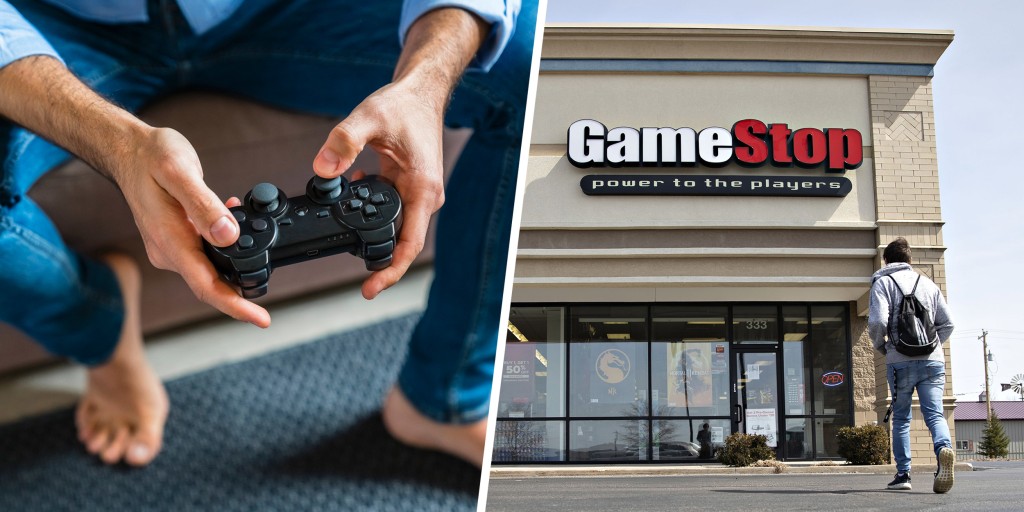‘Roaring Kitty’ returns, sending meme stocks like GameStop surging once again

‘Roaring Kitty’ returns, sending meme stocks like GameStop surging once again – The man at the centre of the pandemic meme stock craze appeared online for the first time in three years, sending the prices of three quirky and volatile shares sharply higher Monday.
Keith Gill, better known as “Roaring Kitty,” posted an image Sunday on the social media platform X, formerly Twitter, of a man sitting forward in his chair a meme used by gamers when things are getting serious.
He followed that post with a YouTube video from years before when he championed the beleaguered company GameStop saying, “That’s all for now cuz I’m out of breath. FYI here’s a quick 4min video I put together to summarize the $GME bull case.”
GameStop in 2021 was a video game retailer that was struggling to survive as consumers switched rapidly from discs to digital downloads. Big Wall Street hedge funds and major investors were betting against it, or shorting its stock, believing that its shares would continue on a drastically downward trend.
GameStop trading halted 8 times before noon
Gill and those who agreed with him changed the trajectory of a company that appeared headed for bankruptcy by buying up thousands of GameStop shares in the face of almost any accepted metrics that told investors that the company was in serious trouble.
That began what is known as a “short squeeze,” when those big investors that had bet against GameStop were forced to buy its rapidly rising stock to offset their massive losses.
At Monday’s opening bell, it appeared that Gill had reignited the phenomenon as shares of GameStop more than doubled. At midday, shares were trading 60 per cent higher. It’s the biggest intra-day trading jump for GameStop since the meme craze of early 2021. Other meme stocks like the theatre chain AMC were jolted higher as well. (Read More: Apple to pay up to $14.4M in iPhone throttling settlement approved by B.C. judge)
Trading in GameStop was halted eight times before noon on Monday due to volatility.
Gill became a cause célèbre in 2021 after his posts on the Reddit subcategory Wallstreetbets ignited a David vs. Goliath battle with large hedge funds that were betting heavily against the survival of GameStop.
The small guys won, at least for a while, driving shares of GameStop up more than 1,000 per cent in 2021, and other meme stocks as well. The struggling movie theatre chain AMC jumped 2,300 per cent in a very short span of time in the same year.
Colossal losses for big traders
Some big traders posted colossal losses as GameStop raced from less than $20 US, to close at $400 each. Citron Research, Melvin Capital and other well-known hedge funds lost an estimated $5 billion, according to analytics firm S3 Partners.
Some of those new and smaller investors believed, at least in part, that Ryan Cohen, co-founder of Chewy.com, could push the traditional retailer in a more online direction. Cohen built up a stake in GameStop before eventually joining the board and last year becoming its CEO.
Joining the meme surge on Monday was AMC Entertainment Holdings Inc., which leapt 33 per cent. Koss Co., a headphone manufacturer, spiked 25 per cent and BlackBerry, the one-time dominant smartphone maker, rose seven per cent. The retailer Bed, Bath & Beyond, another meme stock, sought bankruptcy protection last year.

Some meme stocks, including GameStop and AMC, had been climbing rapidly earlier this month.
Shares of GameStop Corp., which have faded steadily since 2021, had already risen 57 per cent this month. In January, GameStop reported its first annual profit since 2018, although it’s still unclear if Cohen’s turnaround plan will succeed.
AMC had risen 10 per cent over the past 30 days.
Those companies broke out on Monday following Gill’s social media post.
Market dynamics different than last time
The dynamics of the market as far as companies like GameStop are concerned have changed, however.
When Gill and an online army of retail investors began buying up shares of GameStop, more than 140 per cent of the company’s tradeable shares were being shorted.
That distorted number is arrived at because some traders were borrowing against already shorted stocks to build even bigger bets against the company, vastly increasing their losses when the stock began to climb.

The short positions against GameStop’s tradable shares now stand at just over 24 per cent, slightly more than the 22.5 per cent recorded in January.
Gill reaped a big profit investing in a troubled video-game company, but he denied when he appeared virtually at a congressional hearing that he used social media to drive up GameStop’s stock price.
He told lawmakers at the time simply, “I like the stock.”
As Roaring Kitty, Gill had vanished from messaging boards after posting a video in June 2021 of kittens going to sleep.
The story of Roaring Kitty and the meme stock craze was turned into a movie last year called Dumb Money.
Conclusion article ‘Roaring Kitty’ returns, sending meme stocks like GameStop surging once again
Keith Gill, known as “Roaring Kitty,” reappeared online, boosting meme stocks like GameStop. His post led to a dramatic surge in GameStop’s shares, which doubled in value and caused multiple trading halts. This event echoed the 2021 meme stock craze, where retail investors, spurred by Gill’s advocacy, initiated a short squeeze, causing significant losses for hedge funds. Despite a changed market with fewer short positions, Gill’s influence reignited interest in volatile stocks like AMC and GameStop.
Read More : Adaptive Financial Strategies in Facing Economic Changes





